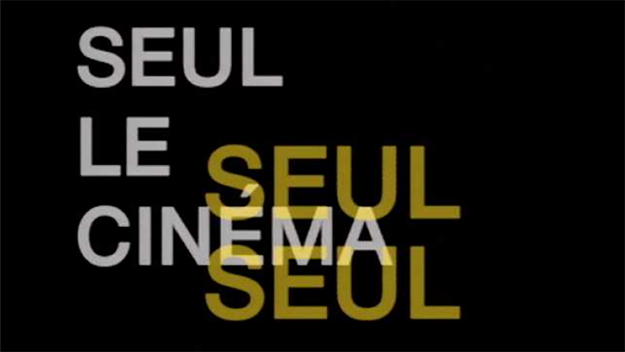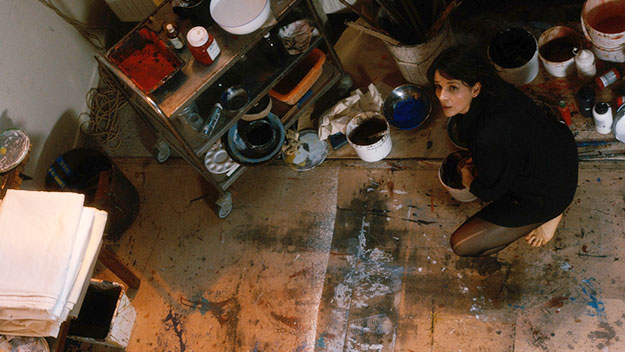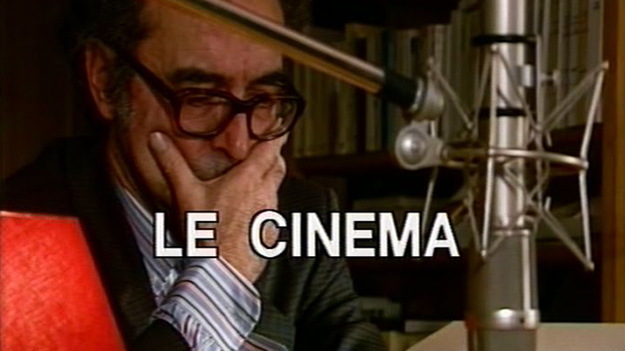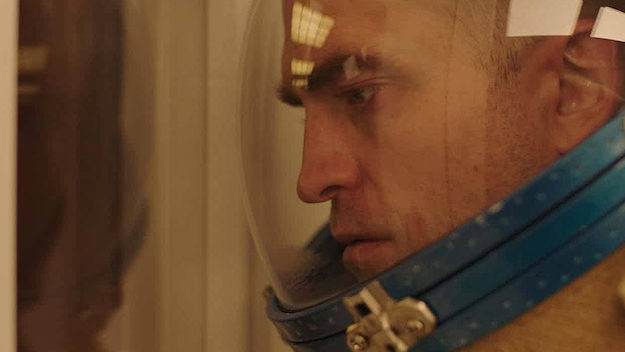Interview: Andrew Litvack

Histoire(s) du cinema: chapitre 2 (Jean-Luc Godard, 1997)
For the Art and Craft department in Film Comment’s May-June 2020 issue, Manu Yáñez Murillo wrote about subtitling, interviewing Darcy Paquet, subtitler for Bong Joon Ho’s Parasite, the films of Hong Sangsoo, and many others. He also interviewed Andrew Litvack, who has subtitled for Jean-Luc Godard and Olivier Assayas. Litvack here details the give-and-take with filmmakers that is involved with subtitles, as well as reflecting on his practice.
Were you a cinephile your whole life? How did you first approach the cinema world?
Yes, I was a cinephile from a very early age but I remember more the movies I wasn’t allowed to see—A Woman Under the Influence or Cabaret—in 1972 or 73, when I was 8 or 9, than the ones I was allowed to see back then: Oliver, Tom Sawyer, etc. It was only when cable TV and VCRs came to the States, around 1976, that I was able to watch all those movies I wasn’t allowed to see in theaters: A Clockwork Orange, Lenny, Providence, Nashville, Chinatown. That’s when I started seeing French movies too. I must have seen Stavisky… by Alain Resnais and Mr. Klein by Joseph Losey back then. So I guess I was always drawn toward forbidden, transgressive stuff, stuff over my head. This may be one of my connections to Claire Denis but I never thought about it till now. It also may be why I can’t really appreciate a movie until I’ve subtitled it. Some misbegotten form of mastery, I don’t know.
As for my approach to the cinema world, when I moved to Paris after graduating in college in 1987, I rented a house from a couple of Egyptians who introduced me to filmmakers Yousry Nasrallah and Youssef Chahine. Chahine asked me if I would reread the subtitles he had himself written for his 1989 film Alexandria Again and Forever. I made tons of changes. Chahine’s English, like his French, was very good but very 1940-50s Alexandria—a mishmash of Shakespearean English, British colonial English, Italian, Greek and Arabic. Someone at the subtitling lab thought I was good at it and I started getting some crappy movies until the year I subtitled both Jean-Marie Poiré’s The Visitors—a hugely successful French comedy spoken in faux old French—and Krzysztof Kieślowski’s Three Colours: Blue. From then on, I went in the two directions which have become my “specialties”: big French comedies that are wicked hard to subtitle and never seen overseas and auteur films.
How do you proceed from the moment you’re assigned to subtitle a movie?
Well, it’s a bit embarrassing to say, but I prefer not to see the movie before starting the subtitles. I like to experience it as if I were a spectator. I constantly have to go back and revise things as I move along but I find myself more implicated than if I watch the movie beforehand. Former professors tell me it is crazy that I work this way because it makes it so much harder, but I never saw it that way. Some directors, like Arnaud Desplechin for example, like me to see the movie first. I understand his point of view and I comply, but I have a hard time paying attention: the second I get to a scene, or hear a line, that makes me wonder how I will subtitle it and then I lose track of what’s going on.
On the other hand, I often see comedies beforehand so some of the puns and wordplay start swimming around my head. Sometimes I even try to see them at group screenings—more and more rare, because we subtitle so early now—to see if there are laughs I didn’t pick up on.

Let the Sunshine In (Claire Denis, 2017)
When you subtitle films based or inspired by literary texts—as Claire Denis’ L’intrus and Let the Sunshine In, where she adapted, very freely, philosophical essays by Jean-Luc Nancy and Roland Barthes—do you feel compelled to go to those texts for inspiration?
With Claire [Denis] there is really no need to pour over the original source material because it’s all been so “deformed” by the prism of her art. Billy Budd—both the book and the opera—didn’t help me with Beau Travail, and Fragments of a Lover’s Discourse in no way helped me with Let the Sunshine In. Claire’s film are among the hardest of all to subtitle because of the poetry of her dialogue. She often uses seemingly simple words and turns of phrase that are extremely overdetermined, like elements of a dream, and extremely condensed, also like in a dream. It’s hilarious because she has no idea how hard her movies are for me, because on the surface, the words are fairly straightforward.
With Jean-Luc Godard I used to try looking for sources—I found quite a few—but he would always claim he couldn’t remember where the words came from. I guess on some level the quotes were also filtered through the prism of his art, but I think he just didn’t care, even if he had me translating something back into English from French, with the original source being English. Maybe the only time I checked a source thoroughly was on 1999 Raúl Ruiz’s Time Regained.
In films like A Prophet or Dheepan, Jacques Audiard used a rich variety of slang and colloquialisms, while Arnaud Desplechin’s writing is very literary. How do you approach that kind of material?
If there is something slangy or colloquial in French I try to find an equivalent in English but not necessary slang or colloquial expressions. French slang is so different from American, they have slang words for shoes, pants—stuff we don’t have in English. And there’s the verlan, a form of slang where words are formed by switching the order of the syllables. I guess I’d say that if an expression doesn’t stick out in French, it shouldn’t stick out in English. If it sticks out in French—say, if it provokes a laugh or a smile—then yes you have to find something. But it’s always on a case by case basis.
In the case of Arnaud (Desplechin), it’s always interesting to approach his literary style, with long sentences. I remember when I translated the script of his English-language movie Esther Kahn, he asked me to only use Latin-based words, nothing Anglo-Saxon. So, for example, instead of saying “I’m carrying my book” it would say “I’m transporting my book.”
Do you interact with the filmmakers when you work on their movies’ subtitles?
I work with all directors on their subtitles except Jacques Audiard, who prefers that I work with Thomas Bidegain, his co-screenwriter, who speaks better English than him. Claire (Denis) reads my subtitles on paper. She never comes to the “simulations”—a meeting in a lab where a technician shows me and the director the movie with my subtitles, and we can stop and start and change things whenever we want. With Olivier Assayas and Arnaud Despechin we constantly bounce ideas off one another. It’s very stimulating. We settle on something, move on, but then I often go back to the subtitles later because I’ve found something better than the thing we’d settled on. This constant looping backwards is for some reason my work method. I always need to restart a movie to find its tone. Interestingly this is how Claire likes to write. When we worked on High Life (the script, not the subtitles), every day we would start reading from page one, get to where we left off, write a page or two, and then, the next day, go back to starting to read aloud from page one. We’re loopers.
When subtitling Claire Denis’s films, and given that she tends to focus a lot on the physical-sensorial aspects of her mise-en-scène, are you specially inclined to synthesize the subtitles?
All subtitles are by nature synthetic. The idea is “traduire, c’est détruire”—to translate is to destroy. What makes me a good subtitler is that I do good damage control. With Arnaud [Desplechin] and Olivier [Assayas] I often supply them with several choices and we choose the one that’s the best compromise. I hate compromising on syntax (i.e. for me, it has to sound like good dialogue) so it’s usually a question of removing details. Choosing which ones to remove.
The other thing that’s interesting with Assayas and Desplechin is that they like to rectify tiny mistakes of their own—unintended confusing things in the original French—in the subtitles. They see subtitling as their last chance to get it right. I am sure if Claire came to the simulations she would be the same way, because when she and I worked on the French subtitles of High Life with a French translator Claire was fascinatingly open to “rewriting” stuff from the movie in the subtitles. As it is, working with her is already a constant form of rewriting, rethinking, reimagining. She rewrites when she writes, rewrites when she films, rewrites when she edits, rewrites in post-synching and, on High Life, she rewrote a bit while working on the French subtitles.

Histoire(s) du cinéma (Jean-Luc Godard)
Godard must be a whole world in himself. How is it to work with such allusive and poetic dialogues and narrations? Subtitling Histoire(s) du cinéma sounds as the most epic work of a subtitler ever. How did you proceeded with that film?
Godard was a trip. It was Gaumont that produced Histoire(s) du cinéma—I remember it all being very hush-hush. I wasn’t allowed to tell anyone I was working on it. I remember after I’d subtitled the first episode, he received a VHS with my subtitles and immediately called Gaumont and said “Ca va pas, les sous-titres. Il faut m’envoyer Litvack tout de suite” (“The subtitles are not right. Send Litvack right now”). The next day I found myself boarding a flight to Geneva where a taxi took me to Godard’s home-studio in Rolle. Gaumont told me to pack an overnight bag, just in case. Jean-Luc was standing at the door waiting for me, smiling. I was nervous about what he had to say about the subtitles but he quickly reassured me, saying: “In fact I re-read the subtitles and I really don’t have anything to say.” Relief. So why the hell was I there? He invited me into his living room, served me a coffee, smoked a cigar… then said: “Would you mind bringing back to Paris a little package for Anne-Marie Miéville?” I soon understood that he had Gaumont send me instead of calling FedEx.
I went to Rolle four or five times—for the other episodes I saw him in Paris. Always the same thing. I never told Gaumont about the packages for his girlfriend or our afternoons together just watching videos. He’d show me stuff from upcoming episodes of Histoire(s) du cinéma, call a taxi, remove a wad of Swiss francs to pay for the ride and send me back with a package for Anne-Marie. As for the subtitles, he did remove a few lines. He always wanted to subtitle as little as possible. But once I understood what he wanted, he stopped intervening. Subtitling Goodbye to Language was wonderful. Again, all he did was remove subtitles. He never really questioned the stuff he kept.
I can’t imagine how hard must’ve been to make the subtitles for Olivier Assayas’ Doubles Vies/Non-Fiction, with that amount of dialogue. How was that experience? I remember reading your subtitles at the Venice Film Festival, and the experience was intellectually demanding, exhausting, but I’m remember processing all the information with clarity.
Doubles Vies/Non-Fiction was crazy difficult but I have to say in all honesty that, more than any other film I’ve subtitled, those subtitles are just as much Olivier’s as they are mine. Olivier helped me a lot when I translated the script one year before working on the subtitles—sometimes I translate French scripts to English so the producers can work on the international funding. He knew all that post-modern literary-circle slang like the back of his hand. That lingo did not come naturally to me. Usually I’d have done research, spoken to friends in New York, but the truth is, I was in Spain on the shooting of Jacques Audiard’s The Sisters Brothers and I didn’t have time, so I needed to devote to Olivier. I felt I was taking advantage of his know-how, but his input was so helpful, so instrumental, that I don’t think I could ever have done better myself. So by the time we did the “simulation,” a year later, I felt like I really had to make up for being absent during the translation of the script—as if I had something to prove to Olivier. And damn, that movie was hard to subtitle.
The editing of Doubles Vies/Non-Fiction was a radical departure for Olivier. Lots of shot-reverse shot, and worse (for me, not for the film), the cut is often before the person speaking finishes his or her sentence. So we had little time for lots and lots of words and lots of complicated ideas. We could never “cheat” to get more time because we’d have to pass over the shot—a big subtitling no-no—and there was always someone speaking afterwards. So, thanks for your compliment regarding the subtitles. I think we did a great job on it. For days after the “simulation” and before the fabrication of the DCP, I would email Olivier with an idea to shorten a subtitle here and there, make things even tighter, easier to read, while keeping the right tone. I think those subtitles are about as tight as they can get and still tell the story and keep the humor of that very smart movie.
I’ve subtitled Olivier’s movies since Irma Vep and on some level I feel that if I have developed a style in subtitling, it is the result of my work with him over the years. His movies—so difficult to subtitle, so quickly spoken, so deftly edited by the late great Luc Barnier, a dear common friend—helped me develop a real penchant for condensed, elliptic subtitles that work as dialogue. They allow the reader to pay more attention to the image and at the same time, they say it all—syntactically they work but you feel they are lean. I don’t use this style all the time but it has definitely influenced my work with Claire [Denis], although hers is a different poetry—if I wanted to “cheat” on her movies, to lengthen the subtitles, I could, because there is little editing and rarely two people doing verbal ping pong, but I want to keep her subtitles as cryptic as the lines spoken, so I use this same elliptical style I’ve honed over the years with Olivier during our “simulations” together.
I think I became aware Olivier’s influence on my work when I subtitled Audiard’s A Prophet. I’m very proud of the job I did on that movie. The characters speak very short and cryptic sentences and my subtitles are short and cryptic, also lean like Tahar Rahim. I remember thinking that I’d just applied to this film noir stuff I’d learned with Oliver. But that also worked on Rust and Bone I think, and probably on Dheepan. So maybe this style is also suited to Audiard’s later movies.
I’m also wondering if it’s easier to subtitle a certain actor or actress after having worked with him or her before. You’ve subtitled Juliette Binoche in Assayas’s Doubles Vies/Non-Fiction, Denis’s Let the Sunshine In and Hirokazu Kore-eda’s The Truth, and you’ve also subtitled Isabelle Huppert in Denis’ White Material and in Mia Hansen-Løve’s L’avenir.
There are actresses like Catherine Deneuve, Virginie Ledoyen or Isabelle Huppert who speak so quickly that subtitling them is always a challenge. The first movie in which I subtitled Deneuve was in My Favorite Season, André Téchiné’s film from 1993. And that’s where I first discover what it is to subtitle an actress who rattles her lines off so quickly. She would speak three sentences and you would have to put it in one sentence in the subtitle. I’d say that my ability to craft condensed subtitles—even before working with Olivier (Assayas)—grew considerably after subtitling Deneuve in My Favorite Season and then in Téchiné’s Thieves (1996). The same would apply to subtitling Huppert in the several films she made with Benoît Jacquot [Keep It Quiet (1999), The School of Flesh (1998), The False Servant (2000)].
The case of Juliette [Binoche] is different because she is different in each movie. Lately, I’ve subtitled her in Let the Sunshine In and The Truth and she’s always surprising. In Let the Sunshine In she does so many things at the same time in terms of acting. There’s this scene at the beginning of the movie, when she’s talking to her friend, played by Sandrine Dumas, and they’re in the bathroom of a restaurant talking about what it’s like having sex with Xavier Beauvois’s character, and in one single line of dialogue Juliette goes from a laugh to bursting into tears. It’s astonishing. When I met Juliette in the shooting of High Life I asked her about this and she said to me: “You can’t do it often in a scene, but you can do it more than once.” So it’s totally planned. She’s like a composer and music player at the same time. From a subtitler’s point of view, it’s a challenge to follow the rhythm—the jerkiness of the line and the abruptness in the acting—and the flow of the emotions in a scene like the bathroom scene in Let the Sunshine in. But that’s what defines a good subtitler. For me it’s impossible to judge my own subtitles, but I can tell you I was in the United States a couple or three years ago and I saw Paul Verhoeven’s Elle with English subtitles—not mine—and I all I could do was to watch the subtitles thinking they were just bad. All the translation was fine but there was something wrong about the rhythm.
And how is it to subtitle Mathieu Amalric? His way to deliver lines also seems particular to me.
The challenge is always to follow the actor’s rhythm. With Amalric you have to deal with his stammering and his way of never finishing his sentences, going in different directions. But it’s not harder to do that than to do something else. I have people that work with me that do the spotting of the movie. They help me cut the movie into different sections for each subtitle. And they know the kind of subtitles that I like: the shortest possible, never going over a shot, as streamlined as possible. You have a margin of how many characters you can have in a subtitle and I try to keep it the lowest possible. I’d rather people watch the movie than read the subtitles. It’s cool to be respected for something that is almost not noticed. Except in a case like Doubles Vies/Non-Fiction, where it’s impossible not to be aware of the subtitles—because they’re there all the time—the best thing you could say about a good subtitle is that is goes without being noticed.
I’m curious to know about the translation of scripts you make for the movie’s funding. Are those translations helpful for the making of the subtitles later?
Almost never. The exception are the films that use a vocabulary that you have to find. In these cases, later you don’t have to do the research for the vocabulary.

High Life (Claire Denis, 2018)
And how was it to work with Claire Denis on the script of High Life?
In High Life we were writing in the set every day. Actors didn’t know their lines until the day of the shooting. It was like a Robert Altman movie. Altman is my favorite director and Jacques Rivette is maybe Claire’s favorite French director. The producers were constantly asking when we were going to finish the script, and Claire always said to them: “You know, there are directors who keep writing throughout the entire movie.” The whole experience made me think of Altman’s Nashville. She brought me to the set and we were writing every night after we finished shooting. It was amazing. And in some level I could apply my subtitling skills to that situation. After each day of shooting, the possibilities for writing became reduced because you had to keep a coherence. With subtitling is just like that. I see a sentence and think of all this different ways to translate it and just go getting rid of words to get to the essential. In High Life’s shooting it was like being in the middle of a puzzle, and every day we were shooting scenes that became new pieces around us, and we were trying to write scenes that would change things from within.
Regarding the practical, financial side of your work, may I ask how many subtitles you make in a regular year?
I work non-stop and I don’t really pay attention to the numbers, but looking at my bills from 2019 I see I subtitled around 15 to 20 films and translated 15 to 20 scripts. For me, professionally, it all started with my meeting with Youssef Chahine in the late 1980s and now I’m well paid, basically because I only do movies, I don’t make subtitles for TV, where they pay a tenth of what I get paid for a film. And when I say I’m well paid I’m referring essentially to the commercial comedies I subtitle, which is in fact a very hard work. It’s curious but no one will ever say to me “you did a really good job on The Visitors” [laughs]. And for that movie I had to invent an English language because it was fake French. There’s also the case of Franck Gastambide’s Pattaya (2016), which was like a teen movie with a group of losers going to Thailand for sex and drugs. That movie was full of wordplay and jokes that seemed impossible to subtitle. Plus, comedies usually have lots of editing cuts and then the subtitles have to be shorter. Pattaya and Les Kaïra (2012), also by Franck Gastambide, are probably the hardest films I’ve ever subtitled. I also subtitled OSS 117: Cairo, Nest of Spies (2006) and OSS 117: Lost in Rio (2009), both by Michel Hazanavicius. But these commercial comedies are dubbed in most countries.
I’m aware that I’m a lucky subtitler. The subtitle industry was invented in France by a company that still exists called Titra Film, which was founded in 1933 by Eastern European Jews. And France is the European country with the most film directors, and all the good ones are incredibly interested in subtitles. Filmmakers like Olivier [Assayas], Claire [Denis] or Arnaud [Desplechin] are very aware of how important The New York Film Festival is for them. The fact is that people who make French subtitles for American films doesn’t get to work hand in hand with Martin Scorsese or Clint Eastwood, but I get to work with directors who are very interested in how their movies are seen worldwide. For me it’s an amazing thing, and I just ask a good price for good film subtitling.
Do you think the combination of the Parasite hit and the availability of foreign films in VOD platforms could change the mindset of American viewers in terms of being open to watch movies with subtitles?
I don’t know. I come from a family who watches subtitles. I can only speak for the East and West coast communities. I think that what happened with Parasite is amazing. But if I’m not wrong Ingmar Bergman’s Cries and Whispers was also nominated for Best Picture not being an English-language film.
But the difference is that Parasite has been a box office success in the States.
Yes, you’re right. Have you seen Parasite with English subtitles?
Yes, and I’m going to interview the subtitler Darcy Paquet in one hour.
I’d love to see his subtitles.
Manu Yáñez Murillo is a film critic and journalist, and has written for Fotogramas, Rockdelux, Ara, and Otros Cines Europa. He is the editor of the anthology La mirada americana: 50 años de Film Comment.







